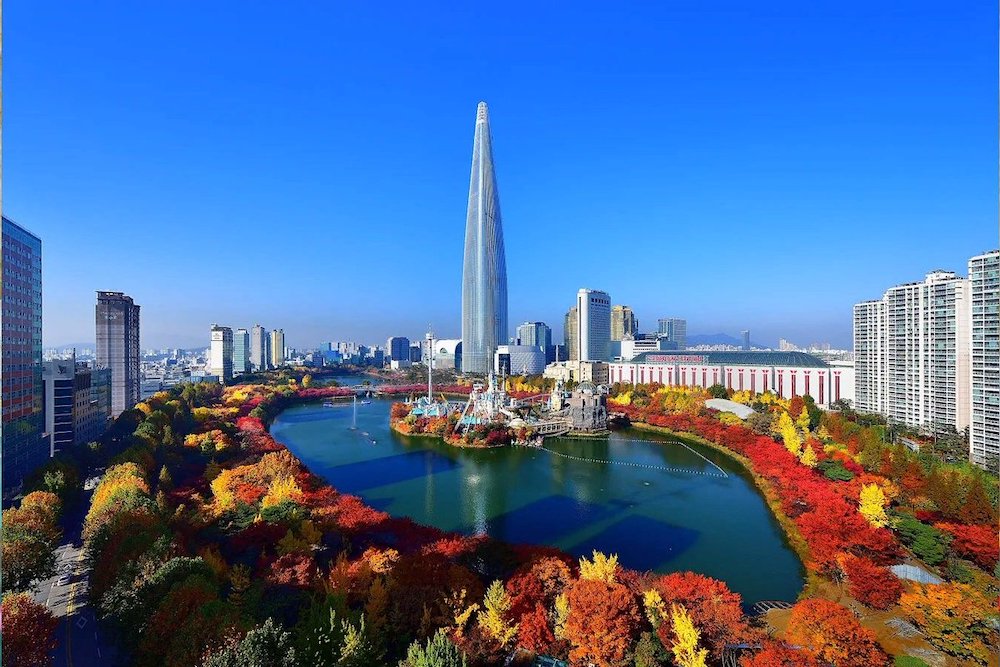How do I get South Korean citizenship?

South Korea is one of those countries that can be called an “economic miracle”. In a relatively short period of time, this country rose from its knees, engaged in the development of digital technologies and took a leading position in the world market in many areas of human activity. Compared to other developed countries, such as Canada and the United States, there has never been a large flow of immigrants. It is worth noting that South Korea is a mono-national state that allows foreign citizens to live, work and obtain citizenship.
Many residents of the former Soviet Union began to leave for Korea to earn money, and in some cases to get a residence permit and a South Korean passport. Why does this country attract the interest of citizens of the former Soviet Union? In this article, we will try to understand all the nuances of obtaining a residence permit in South Korea.
How do I get a residence permit in South Korea? Is it easy to become a resident of this country?
For a long time, citizens of former Soviet Union countries were required to obtain a special visa to enter South Korea. Starting in 2014, travelers from Russia, Ukraine and Kazakhstan were allowed to stay in the country for another two months without a visa. However, this time is given exclusively for the implementation of tourist purposes. If you want to work or study for this short period of time, you will still have to get a visa, otherwise you may be deported from the country for non-compliance with legislative acts and norms.

In South Korea, any form of stay on the territory of the state is called a visa, regardless of whether you stay here for a while or on a permanent basis. Korea is a developed country, so, as in other Western countries, it provides immigrants with a large number of types of visas. Each group of foreigners will be able to choose the most suitable residence permit for themselves. For students, factory workers, and people who have married local Koreans, there is a suitable visa form. Their number reaches 34, and you can classify visas into the following types::
- official or diplomatic documents,
- short-term loans,
- non-profit organizations,
- long-term,
- worker.
Each species has its own subspecies, if you count them all, we get about 200 varieties. Our publication will cover the most popular and popular forms.
How can I get a residence permit in South Korea?
If you have visited Korea as a tourist, you can only stay on its territory for two months without obtaining a visa. In some cases, this period may be extended by another 30 days. Situations where the government is willing to make an exception include a disaster, illness, or accident. You will need to get additional documents from the migration service and be sure to register.
Korean residence permit for students. If you want to enroll in an educational institution in South Korea, then there are two types of visas specifically for students – short-term and long-term. The first type of D-4 is suitable for those students who want to take courses. The second type of D2 visa is intended for obtaining a full-fledged education in higher education institutions.

International students enrolled in South Korean educational institutions can not only study, but also work. In this case, it means working part-time. While studying, a student can work about 20 hours a week, as for the holidays, the number of hours increases to 40. If a student is considering a full-time internship at a company or is trying to get a contract job, then in this case they will need to get a special S-3 visa. He needs to discuss some issues with the company’s management and sign a contract. The contract should include the fact that when they hire you, they know that you are studying and will not be able to stay with the company full-time. After signing the contract, the student must visit the migration service, where they will be issued a corresponding document.
After a student receives a higher education diploma, they need to apply again for a different visa – an intermediate or D-10. This type of permit provides a university graduate with 6 months to search for a job after completing their studies.
If he was able to successfully get a job in one of the companies in South Korea, then he again has to apply to the relevant government agencies, where he will be granted a work visa. The main difference between a South Korean work visa is that it is linked to a specific employer. In other words, if you get a job in one place and then decide to change jobs, your visa automatically loses its “validity”. Even if there was still a lot of time left on it, the document is canceled due to a change of company. A foreigner is given 30 days to complete all their business and leave the country.
However, do not despair, if you want to stay in South Korea, then there is a workaround. A graduate of a local educational institution needs to contact the migration service again and get back a special D-10 visa. This way, you will get a six-month delay in finding a new job. After signing a contract with a new employer, you will be issued a work visa again.
South Korean citizenship for ethnic Koreans
 Korean citizens living outside of South Korea are provided with special conditions. They can apply for various types of permits, including short-term, working, and guest permits. They are also allowed to leave and return to the country. It is worth noting that Koreans who are citizens of other countries can immediately apply to the migration service for a special F-4 visa. This permit is temporary, but is issued for a relatively long period of time-five years. It can be extended in the future. There are some restrictions regarding the time spent abroad.
Korean citizens living outside of South Korea are provided with special conditions. They can apply for various types of permits, including short-term, working, and guest permits. They are also allowed to leave and return to the country. It is worth noting that Koreans who are citizens of other countries can immediately apply to the migration service for a special F-4 visa. This permit is temporary, but is issued for a relatively long period of time-five years. It can be extended in the future. There are some restrictions regarding the time spent abroad.
Most foreign Koreans, when applying for an F-4,are in no hurry to renounce the citizenship of another country and are located on the territory of South Korea with this permit. This is not only convenient, but also beneficial for those who do not want to serve in the army. If you become a Korean citizen, you must complete the service without fail, even if you are going to live in another country for some time.
If you want to apply for an F-2 visa, you should know that it is in some sense a “residence” or temporary residence permit. You can get this permission in several ways. In most cases, foreign citizens resort to marriage with the indigenous people of South Korea. To get an F-2, you need to collect a package of documents, as well as provide a marriage registration certificate. The visa is issued first for three years, and then it can be extended or immediately apply to the migration service for an F-5 visa, which allows you to live in South Korea permanently.
Also, a visa can be granted to foreign migrants who have lived in the territory of this country for a long time and have played a significant role in the life of the state. You should understand that this method is complicated because everyone understands “benefits” in their own way, and there are no clear requirements that will allow you to equally evaluate the merits of a person.
There is another proven way to get a South Korean residence permit. Despite the fact that it is relatively unpopular, it has its advantages. There is such a thing as” migration of professionals ” or residence permit for qualified specialists. It is quite easy for such migrants to apply for a special F-2 visa. After a year of working in South Korea, you will be able to apply for this permit. Certain visas are granted to engineers, doctors, professors, etc. But do not rush, you must prepare, pass the test and score at least 80 points out of 120. Of course, the final decision is always left to the migration service, but if you have passed this threshold, then the probability of obtaining a residence permit increases significantly. After this visa expires, specialists will be able to apply for a permanent F-5 and then become a citizen of this country.
It is important to know that having obtained an F-2 visa as a qualified professional, you have the right to move to South Korea with your entire family on the same visa. It is for this reason that this method is interesting for those who know their field of activity very well.
How to get a temporary residence permit at the expense of investments?

In this country, you can get a temporary residence permit if you invest a certain amount of money in a local company. First, foreign investors need to obtain a C-2 business visa, then transfer at least 300 million won or 224 thousand euros to a local business account. Thus, you can either purchase someone else’s company or become a partner of any existing company. As a result of these manipulations, you will be issued a temporary D-8 permit.
However, after receiving a visa, you should not relax. The permit is only valid for one year, so don’t waste your time. Previously, foreign investors could invest money in a company and do nothing for a year. Currently, the requirements have changed. After the visa expires, a routine check will be performed, during which you will need to prove the high efficiency and profitability of the company. If you successfully complete this procedure, your visa will be extended, otherwise, it will be canceled.
At the moment, the investor can choose a company from any field of activity, so it is not necessary that your company specializes in the production of spaceships or the creation of drugs for all diseases. A foreigner can invest their money in a small company and receive their monthly interest and, of course, reside in South Korea.
A special visa can be issued to employees who have been transferred between international branches of the corporation. For example, an experienced and competent employee from Europe was sent to South Korea.
Obtaining citizenship in South Korea

Despite the fact that in South Korea, foreign migrants are given the opportunity to obtain various types of permits, you can try to apply for permanent residence. This document is referred to as F-5. A person with this status can stay permanently on Korean soil, while the permit has no time restrictions and will be valid until you want to apply for South Korean citizenship or decide to refuse it. You may also be deprived of these privileges if you violate the law.
The special feature of this type of visa is that you can live and work in this country, and you do not have to constantly run to the migration service. However, it should be understood that in this case there are certain nuances that should be observed. If you decide to go abroad, then you should return to South Korea earlier than six months from the date of departure. Otherwise, you will be stripped of this status.
As for foreign Koreans, the state meets them halfway in this regard. They are allowed to enter and leave the country at any time, and do not need to get an additional permit. Even if the visa was canceled, it will be easier to get it if you are a representative of Korean nationality.
Who can get permanent residence in this developed country? You can apply to the migration service for this status in the following cases:
- stay in South Korea for more than five years,
- official registration of marriage with a Korean native,
- whether your children have citizenship,
- investments exceeding five hundred thousand dollars in the country’s economic development,
- representatives of Korean nationality who are citizens of other countries must meet certain requirements,
- Chinese people who were born and reside in Korea,
- people who have completed a degree in digital technology,
- qualified specialists.
To marry a native South Korean, a person needs to stay in the territory of this country for at least two years. If one of the spouses of a foreign couple has died, then the status of permanent residence can be issued in a shorter time. Also, such privileges are granted to people who are responsible for children who have not reached the age of majority.
It is worth noting that many migrants, wishing to get a permanent place of residence, decide to enter into a fictitious marriage. This method has become so popular that in some regions of the country, about 50 percent of marriages were made with newcomers. This fact could not go unnoticed by the authorities, so they decided to make some changes. Before registering a marriage with a South Korean citizen, you must have a certain amount of money in your bank account, as well as pass a Korean language proficiency test.
Immigration to Korea by investing money in the country’s economy
 In this country, there is a special program that allows you to immediately purchase permanent residence. In this case, foreign investors need to invest at least 500 thousand dollars in the economic development of Korea, that is, you can buy real estate or government securities. In most cases, investments go to the development of Jeju Island or in the Inchion Free Trade Zone.
In this country, there is a special program that allows you to immediately purchase permanent residence. In this case, foreign investors need to invest at least 500 thousand dollars in the economic development of Korea, that is, you can buy real estate or government securities. In most cases, investments go to the development of Jeju Island or in the Inchion Free Trade Zone.
You don’t have to look for properties that you want to invest your money in. The Government is responsible for this event. You will be offered projects that were selected by the state. It is worth noting that their cost is growing very quickly. By the time you finish reading these lines, the price may have increased. Demand for South Korean projects is quite high, and about 80 percent of the total number of foreign investors is Chinese. If you want to use this method to emigrate to South Korea, then do not hesitate for a long time, because the cost continues to grow every minute.
How do I acquire South Korean citizenship?
You can get a passport in various ways. We will review the most popular ones.
If the parents of the newborn are unknown, or they were abandoned in the country, they will automatically be granted South Korean citizenship. The very fact that a baby is born does not automatically grant him the right to obtain citizenship, so you should not specifically fly to Korea to give birth here.
If at least one of the child’s parents has obtained Korean citizenship, the child can become a candidate for this status. If the father of the newborn is a native of that country, then the child is eligible for citizenship.
A person who was born in South Korea, whose parents are ethnic Koreans, and who has lived in the country for at least three years becomes a candidate for citizenship.
Registering a marriage with a Korean citizen will also make it easier to obtain citizenship. The standard procedure requires that the following conditions are met::
- stay in Korea for at least five years,
- reaching the age of majority,
- availability of funds for its own security,
- knowledge of the local language and laws.
Dual citizenship in South Korea – tips for foreigners

For a long time, this country did not allow more than one passport. If you were granted South Korean citizenship, you had to give up all other citizenship rights. Currently, foreign migrants who receive a South Korean passport can retain the citizenship of another country, in particular, if they are allowed to have two passports at once in their homeland. These countries include the United States, Russia, etc.
If you are lucky enough to have a Korean passport, even if you have other documents with you, you will be considered Korean. Exit and entry must be carried out at the expense of a Korean passport.
However, do not forget about one more nuance, which we mentioned above. Every South Korean citizen must serve in the army. This rule applies to male representatives. If you have already exceeded the age threshold of a conscript, then you don’t really need to worry.
Many historical Koreans, having a Russian or US passport in their hands, do not dare to obtain dual citizenship, because they do not want to serve in the army. In most cases, they apply for an F-4 visa. With it, they can live in peace and comfort.
This section applies only to people who already have a foreign passport. If a Korean citizen wants to acquire another passport, they will have to lose their current status.
How does taxation work in South Korea?

The tax system has a rather complex structure. It is divided into two parts – national and local. The first category includes the following types of taxes::
- customs offices,
- corporate clients,
- income taxes,
- on inheritance,
- VAT, etc.
Local taxes include duties on the use of tobacco products, education, property, etc. There are also city and provincial taxes. Each division conducts training camps and uses this money to develop regions, build roads, and direct funds to other needs.
Companies that plan to export goods are granted certain benefits. Start-up entrepreneurs can also get loans that will help them pay VAT. In any case, opening a business in this country is not only convenient, but also profitable.













Leave a Reply